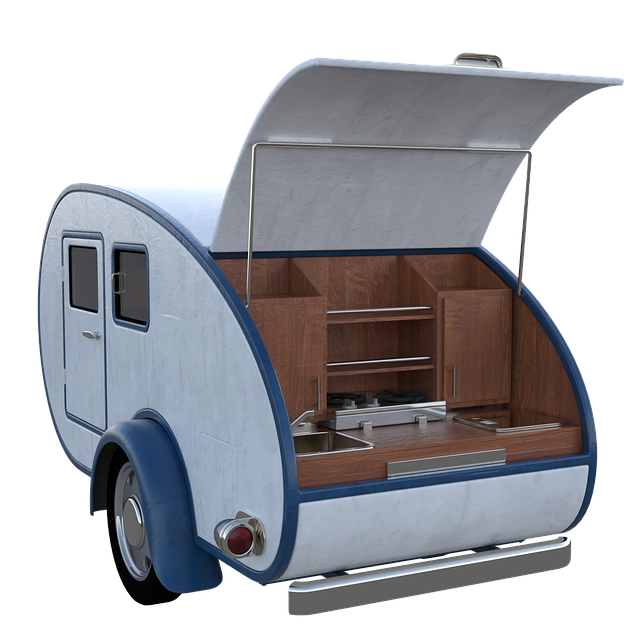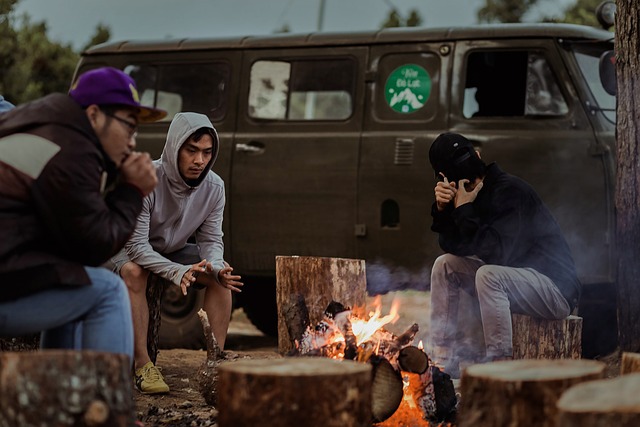Campers exploring Lane County around Eugene, Oregon, must understand local regulations and prepare accordingly. The county offers diverse campsites, from established RV parks to remote primitive areas, each with unique rules on permits, fire safety, waste disposal, and wildlife interactions. Essential gear for safe and comfortable camping includes weather-rated tents, sleeping bags, cooking equipment, and emergency communication devices. Fire safety is paramount due to dry summers and wildfire potential, emphasizing responsible practices like checking fire danger levels and proper extinguishment. Wildlife encounters require food storage solutions, campsite cleanliness, and knowledge of local guidelines to ensure safe interactions with bears and deer. Finally, preparing for emergencies by assembling a tailored kit enhances safety for all campers in Lane County's scenic landscapes.
Planning a camping adventure in Eugene, Oregon? From bustling RV parks to secluded primitive sites, Lane County offers diverse outdoor experiences. Ensure your trip is safe and memorable by understanding local regulations, choosing the right campsite, packing essential gear, and mastering fire safety practices. This guide provides essential tips for navigating the great outdoors near Eugene, covering everything from wildlife encounters to emergency preparedness, so you can explore with confidence.
- Understanding Lane County's Camping Regulations and Permits
- Choosing the Right Campsite: Eugene RV Parks vs. Family-Friendly Sites
- Essential Gear for Safe and Comfortable Camping Near Eugene
- Fire Safety and Responsible Camping Practices in Local Forests
- Wildlife Encounters: Coexistence and Safety Measures in Primitive Camping Areas
- Emergency Preparedness: What to Do Before, During, and After Your Outdoor Adventure
Understanding Lane County's Camping Regulations and Permits

Understanding Lane County’s Camping Regulations and Permits is essential for any adventurer planning a trip to the scenic landscapes around Eugene, Oregon. Lane County manages various campsites, from established RV parks near Eugene to more remote primitive camping areas, each with its own set of rules and requirements. Before setting up camp, visitors should familiarize themselves with local regulations regarding permits, fire safety, waste disposal, and wildlife interactions. These guidelines are in place to preserve the natural environment and ensure a safe and enjoyable experience for all.
For family campsites in Eugene and nearby areas, obtaining the necessary permits is crucial. Lane County offers online resources and visitor centers where campers can secure permits, learn about campsite availability, and gain insights into seasonal restrictions. Adhering to these regulations not only respects the natural habitat but also protects campers from potential fines or disruptions. Whether exploring the bustling RV parks or venturing into more secluded primitive camping sites in Lane County, understanding and following these guidelines will contribute to a memorable and safe outdoor adventure for all.
Choosing the Right Campsite: Eugene RV Parks vs. Family-Friendly Sites

When planning a camping trip in and around Eugene, Oregon, whether it’s an RV getaway or a family adventure, choosing the right campsite is paramount. Lane County offers a diverse range of options, from well-equipped RV parks to primitive sites nestled among the natural beauty. For RV enthusiasts, Eugene RV parks provide ample amenities like hookups for electricity, water, and sewage, making them ideal for comfortable stays. These parks often feature modern facilities, including restrooms, showers, and even laundry services, catering to travelers seeking convenience.
In contrast, family-friendly campsites near Eugene prioritize a more immersive outdoor experience. Many of these sites are located within scenic state parks or national forests, offering easy access to hiking trails, rivers, and other recreational activities. They typically have basic amenities, such as picnic tables and fire rings, encouraging visitors to connect with nature. For those seeking a blend of modern conveniences and natural allure, exploring both Eugene RV parks and family-friendly sites ensures a memorable camping experience tailored to individual preferences.
Essential Gear for Safe and Comfortable Camping Near Eugene

When planning a camping trip in and around Eugene, Oregon, having the right gear is paramount to ensuring safety and comfort. Essential items for any camper include a sturdy tent suitable for the local climate and conditions, comfortable sleeping bags rated for the expected temperatures, and reliable camping stoves or lanterns for cooking meals. Don’t forget adequate lighting solutions like flashlights or headlamps, especially if you plan on exploring after dark.
For those visiting Lane County campsites with their RVs, make sure to bring leveling blocks and stabilizers for a secure stay. Family-friendly Eugene RV parks often offer additional amenities like running water, electric hooksups, and restrooms, making them ideal for a comfortable camping experience. For those seeking primitive camping in more secluded areas of Lane County, gear for weather protection, food storage (to deter wildlife), and emergency communication devices are crucial.
Fire Safety and Responsible Camping Practices in Local Forests

Camping enthusiasts in and around Eugene, Oregon, should prioritize fire safety and responsible camping practices when exploring local forests. With its lush landscapes and diverse ecosystems, Lane County offers a range of campsites, from RV parks to primitive sites, attracting both seasoned campers and families seeking outdoor adventures. However, due to the region’s dry summers and potential for rapid wildfire spread, it’s crucial to understand fire safety guidelines.
Before setting up camp, familiarize yourself with local regulations and fire danger levels. Many campsites in Eugene and its surroundings have designated fire pits or rings, but it’s essential to use them responsibly by never leaving a fire unattended. Always ensure proper extinguishment after each use. For primitive camping areas, follow the “leave no trace” principle by disposing of waste responsibly, as these sites often lack structured amenities. By adhering to these practices, campers can contribute to the preservation of beautiful natural spaces while minimizing potential risks associated with wildfires in Lane County’s vibrant forests.
Wildlife Encounters: Coexistence and Safety Measures in Primitive Camping Areas

When venturing into the great outdoors for a primitive camping experience in Lane County, Oregon, around Eugene, it’s essential to be prepared for potential wildlife encounters. Coexistence with nature is a significant part of the adventure, but safety should always be a priority. Animals like black bears and deer are common in these areas, drawn by food sources and human presence. To minimize conflicts, store all food securely in bear-resistant containers or hung bags. Keep your campsite clean, promptly disposing of trash, as food scraps can attract wildlife.
Familiarize yourself with local guidelines and warning signs at campsites Eugene OR and RV parks near Eugene. Know the proper response to a bear encounter, such as making noise to deter them, and always carry bear spray as a last resort. By following these simple measures, campers can enjoy their time in nature while ensuring safe interactions with Lane County’s wild residents, making your family campsites Eugene experience memorable for all the right reasons.
Emergency Preparedness: What to Do Before, During, and After Your Outdoor Adventure

Before embarking on your outdoor adventure in and around Eugene, Oregon, whether at a bustling campsite in Lane County or a primitive location in the nearby wilderness, it’s crucial to prepare for potential emergencies. Start by researching and understanding the specific hazards of your chosen area, whether it’s wild animals, unpredictable weather, or remote locations with limited access to services. Create an emergency kit tailored to these risks, including essentials like first-aid supplies, flashlights, extra batteries, water purification tablets, high-energy food, a whistle for signaling help, and a detailed map of the area.
During your trip, maintain open lines of communication. Inform someone back home about your itinerary, expected return time, and location. Stay alert and watch for potential hazards. If an emergency arises, remain calm, assess the situation, and take immediate action based on your pre-trip planning. After the incident, report it to relevant authorities and update your loved ones on your status. This proactive approach can ensure a safer experience while camping in or around Eugene’s beautiful landscapes, whether at RV parks catering to families or secluded primitive campsites.






